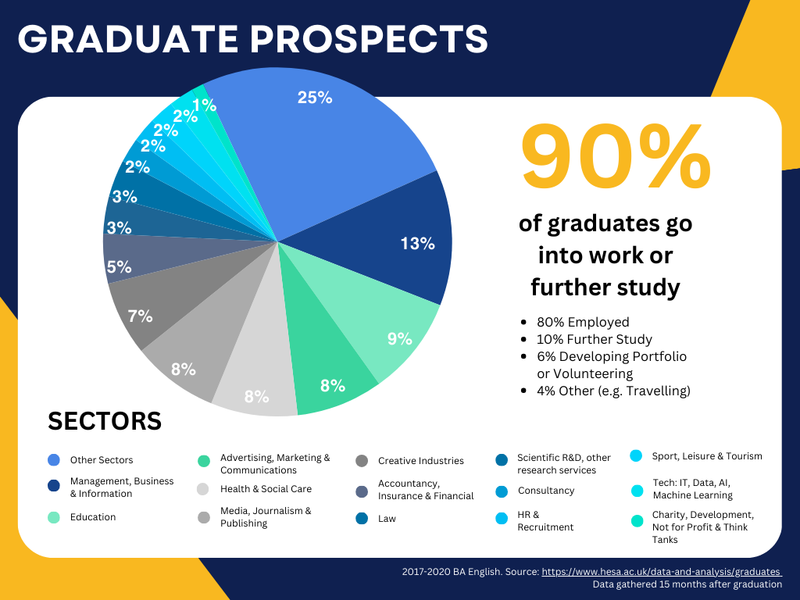What can you do with an English degree?
Oxford English graduates have progressed into careers in every sector of employment, including arts, education, retail, charity and social work, marketing and communication, media, journalism and publishing, leisure, tourism and, of course, academia. Our alumni have become lawyers, managers, writers, broadcasters, producers, entrepreneurs, teachers, designers, fundraisers, novelists, accountants, chefs, actors, directors, management consultants, speechwriters, civil servants, opera singers, publishers, social workers, hedge-fund managers, and stand-up comedians. The list is potentially endless. Within a few years of graduating, alumni have been gainfully employed doing everything from editing scripts for Dr Who, to reporting on conflicts in the Middle East, designing computer games, or, in one case, making a documentary on chlamydia in koalas!
The reason Oxford English graduates are flourishing in a such a broad range of careers and professions is that the degree is not just stimulating and enjoyable but also develops core highly marketable skills. Years of studying literary language, writing analytical essays and receiving detailed feedback gives our alumni an extraordinary command of language and an ability to present arguments, ideas and materials with clarity, force and precision. In this era of ‘fake news’, evasion and distortion, an eye for detail, nuance, accuracy and implication has never been more valuable. Individual research projects and the discipline of developing and defending independent ideas every week produces self-disciplined graduates with high levels of initiative, resourcefulness and imagination. Trained in analyzing large bodies of evidence, engaging with new theories, and absorbing and critiquing alternative interpretations, English graduates are adept at synthesizing different approaches. The Oxford tutorial is all about challenging assumptions, exploring possibilities, and thinking again, so it fosters independent and flexible thinking.
Studying literature written from the seventh century onwards might seem a peculiar preparation for engaging with the modern job market and the issues and challenges that face our society. Yet the Oxford English degree involves understanding the relation between individual thought and expression and the social, political, philosophical, religious and scientific ideas and values of the time. It is about studying literature as event, as a response to contemporary society, as intervention and provocation, as a vision of the other possible worlds and selves we could inhabit. Studying English is about thinking creatively and imaginatively. It is about who we are, who we have been, and who we could be. That is why having studied literature for three or four years, and having learnt how to learn, English graduates have flourished in an extraordinary range of careers.
Covid 19 and Admissions
The impact of Covid 19, months of lockdown and school closures have inevitably interrupted and disrupted studies, bringing unprecedented challenges for the current generation of school students. You may well feel more anxious about achieving the required grades in your exams, and less confident about your ability to make a successful application to Oxford. Do remember, however, that admitting tutors will take every applicant’s circumstances into account. Above all, Oxford admissions is about trying to assess each applicant’s essential skills and their potential, not just their exam grades. We’re looking for where we think you can get to in three- or four-years’ time, not just where you are when you apply. So, don’t let the disruptions of the past year put you off applying.

2017-2020 BA English. Source: https://www.hesa.ac.uk/data-and-analysis/graduates
Data gathered 15 months after graduation
Text description of the graph above:
The graph shows that 90% of graduates go into work or further study.
Employed: 80%
Further Study: 10%
Developing Portfolio or Volunteering: 6%
Doing something else (e.g. Travelling): 4%
Breakdown by Industry sector:
Other (25.29%)
Management, Business & Information Services (12.64%)
Education (9.20%)
Advertising, Marketing & Communications (8.05%)
Health & Social Care (8.05%)
Media, Journalism & Publishing (8.05%)
Creative Industries (6.90%)
Accountancy, Insurance & Financial Services (4.60%)
Law (3.45%)
Scientific R&D & Other Research Services (3.45%)
Consultancy (2.30%)
HR & Recruitment (2.30%)
Sport, Leisure & Tourism (2.30%)
Tech: IT, Data, AI & Machine Learning (2.30%)
Charity, Development, Not for Profit & Think Tanks (1.15%)



